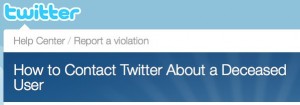May 6 is Digital Death Day
 Are you interested in the conversation around digital death? Do you want to learn more about family access to accounts after a death, legal issues like terms of service and digital property rights, or archival and curation of data? What about the individual’s right to delete data and declare themselves digitally dead?
Are you interested in the conversation around digital death? Do you want to learn more about family access to accounts after a death, legal issues like terms of service and digital property rights, or archival and curation of data? What about the individual’s right to delete data and declare themselves digitally dead?
Now’s your chance to get involved.
Digital Death Day North America will see 75 – 125 attorneys, entrepreneurs, researchers, archivists and leading minds gather to discuss the issues shaping this emerging space. Add your voice to the group and share your ideas on how the future could be, and your perspective on what’s important.
From the organizers:
Digital Death Day is a collaborative unconference where attendees will work together to explore how we should deal with our online profiles after death. This is the 3rd Digital Death Day and the 2nd such event in North America. The event immediately follows the 12th Internet Identity Workshop planned for May 3-5 at the same location.
The unconference format allows for an agile event, where everyone is welcome to contribute. Beginning at 9:00 AM we start with a blank wall and though an hour-long, interactive process, create a full day, multi-track conference agenda that is relevant and inspiring to everyone in attendance. Digital Death Day will be facilitated by Kaliya Hamlin who has designed and facilitated over 100 unconferences for professional and technical communities.
- How can I decide what should be done with my social network profiles and other digital assets?
- How can I inform my online friends of my death and share with them my final messages?
- How can I be sure that big companies (like Google, Facebook, Yahoo and Microsoft) will respect my wishes?
- Does the past have value? Should we make an effort to preserve it?
- Is it too old school to die and be dead?
- How will the wealth of preserved information change the way that future generations look back at us?
- How are you preparing for your own death?
- What services are available?
- What are the policies for e-mail accounts and social websites when you die?
- What about digital assets that are jointly held?
- What happens to the references to other people in the deceased person’s digital assets?
- What happens to the digital assets with references to the deceased person?
If you are an entrepreneur, Internet service professional, attorney, estate planner, researcher, technologist, archivist, policy maker, funeral director, a member of the media, or planning your digital will, your perspective and participation is needed an valuable.
Digital Death Day North America
May 6, 2011 9 AM TO 5 PM
Computer History Museum
1401 N Shoreline Blvd
Mountain View, CA 94043
12th Internet Identity Workshop
May 3 – 5, 2011
Download Your Content From Facebook
Facebook announced a new feature yesterday that allows you to download all of your photos, videos, wall posts, notes, messages, events and friends. This data accessibility feature is a major step for Facebook, which has always been a “walled garden” – a place to put information, but very difficult to extract it again.
The ability to retrieve content from your Facebook account will be tremendously helpful to those who are struggling with the online accounts of a departed loved one. Provided you know the email address and password to the deceased’s account, you can archive their content in case it is needed or wanted in the future.
This feature is also useful for those who wish to deactivate their loved ones’ Facebook account after death as it offers a way to safeguard the data before it is removed from the web. (Be advised, though, that Facebook retains all users’ data on their servers after account deactivation, even if the account is no longer publicly accessible on the web. There is currently no way to permanently delete an account from Facebook.)
Here is a video explaining the steps. The roll out of this new feature to its 500 million users will be incremental (I haven’t yet received it).
Twitter Posts Deceased Policy
 Twitter has released a deceased policy that will hopefully be a step toward removing dead users from their recommendation engine. From all indications the social network has not yet announced the policy which will help family and friends of loved ones to retrieve an archive of their tweets or remove the account.
Twitter has released a deceased policy that will hopefully be a step toward removing dead users from their recommendation engine. From all indications the social network has not yet announced the policy which will help family and friends of loved ones to retrieve an archive of their tweets or remove the account.
Twitter’s Deceased Policy
If we are notified that a Twitter user has passed away, we can remove their account or assist family members in saving a backup of their public Tweets.
Please contact us with the following information:
- Your full name, contact information (including email address), and your relationship to the deceased user.
- The username of the Twitter account, or a link to the profile page of the Twitter account.
- A link to a public obituary or news article.
You can contact us at privacy@twitter.com, or by mail or fax:
Twitter Inc.,
c/o: Trust & Safety
795
Folsom Street, Suite 600
San Francisco, CA 94107
Fax: 415-222-9958
We will respond by email with any additional information we might need.
Please note that we cannot allow access to the account or disclose other non-public information regarding the account.
Was it something I said?
A mere 72-hours ago I exchanged tweets with Doug Bowman, @stop, Twitter’s Creative Dirctor, about my post Twitter Recommends Dead Friends. He advised me that he would pass along the post to the support team overseeing the topic.
I don’t know if it was that post that finally made them take action on developing a policy or if it was already in the works and was sped along by the many complaints from their users about seeing dead friends recommended.
However this new policy came to be, I’m glad that Twitter now has something in place that will help family or friends of users who have passed away to archive the tweets or remove their accounts.
Twitter Recommends Dead Friends
 On July 30th, Twitter announced that it was releasing a feature to recommend friends to follow right on the sidebar of the site when you log into Twitter.com. It was only a matter of time before their Who to Follow algorithm turned up someone who had passed away.
On July 30th, Twitter announced that it was releasing a feature to recommend friends to follow right on the sidebar of the site when you log into Twitter.com. It was only a matter of time before their Who to Follow algorithm turned up someone who had passed away.
My friend Dean Whitbread, @dfrw, alerted me this morning that upon logging in and seeing this feature for the very first time, he was disturbed to see his friend Ro, @lilyhill, recommended as someone to follow. She had died unexpectedly of a stroke in May 2009. Two days later, Ro’s daughter used her mom’s cell phone to text a last message to the account to notify @lilyhill’s friends of her passing.
Facebook does it too
This same problem has been on Facebook since they rolled out their Suggested Friends feature in March 2008. And automated friend recommendations without the context of whether the person is alive or dead is the source of one of the most frequent complaints that I hear about Facebook.
However, in Facebook, users have the ability to report a user deceased and memorialize their account. A memorialized account removes some personal information, prevents new friend requests and still allows existing friends to post messages to the deceased’s Wall. It also removes the user’s account from the “Suggested Friends” algorithm so that your dearly departed does not appear there.
Twitter’s deceased policy
Twitter has no such ability to deal with the deceased’s account. In fact, Twitter has no policy regarding the death of a user at all. The closest they have is an inactive accounts policy which states “Accounts may be removed from the site due to prolonged inactivity,” which they consider to be six-months. The policy then goes on to say they’re working on a way to release these accounts in bulk, but that they have no time line for when this might happen.
The account of the first person I knew on Twitter to pass away, @mochant, in December of 2007, is still there, well past the six-months to be considered an inactive account on Twitter.
The human side of the equation
Speaking to Dean Whitbread this morning about his friend @lilyhill, he remarked “we felt like family.” After her death in May 2009, he wrote blog post about Ro as a way to acknowledge his grief and pay tribute to his friend whom he’d known online for 18- months.
A comment on that post left by @Otir, another of Ro’s online friends, talked about how she was grieving online.
“I am still feeling bereaved, probably because unlike if we were close blood family, I haven’t been actually able to pay my respects and attend her funeral or say goodbye in a proper way, I guess writing a tribute for a friend we met online is the proper way to do it.
I miss Ro a lot. She had become part of my daily life because we had often the same twitting hours and moments. Her absence is felt by this online silence that captures the exact essence of what death can be: silence.”
When we chatted this morning about seeing Ro in the Who to Follow box, Dean expressed how seeing her avatar there reminded him of the grief and loss he felt, and made him miss @lilyhill all over again. He summed up his feelings about the impact online friendships in his memorial blog post 15-months ago:
“It’s not just the convenience of messaging, adding a follower, the ubiquity of the internet – it is the meeting of minds, the touching of souls, the shared sensibilities, the humour, the wisdom, the kindness and the love. Don’t believe it when they tell you that internet friendships are not real.”
Sadly, online social networks using algorithms to build connections between users fail to take into consideration the real human emotion of what that means to people when those connections are lost.
Update #1: I was reminded that LinkedIn also has this practice of recommending people who have passed away.
Update #2: (via @SuzanneLong) Matt Haughey, (@mathowie) lamented, “Not you too Twitter? Facebook did this on every login. Developers: add status field of “deceased” in your apps.”
It drew this response from Doug Bowman (@stop), Twitter’s Creative Director, “@mathowie Sorry, Matt. We know this is an issue. We’re looking at solutions that preserve the profile yet keeps the user out of suggestions.”
Doug Bowman, himself, has had a run in with this issue when he commented last December, “LinkedIn keeps suggesting I add a dear friend who died last year. We (social media) still fail to handle this gracefully.”
Update #3: Here are more cases of people being recommended deceased people to follow: @GeoShore @croyle @apogeum @BigToys
Update #4: After sending a tweet to @stop about the issue and a request to speak with someone at Twitter, I received a reply that he had passed this post on to the support team dealing with the topic. Inroads…
Gray Questions Deceased Social Profiles
Silicon Valley tech blogger Louis Gray recently asked on his blog: Should Social Profiles Live on When People Die?
He’s questioning why it’s not easier to report that a Facebook user has passed away. Louis must have missed that day last October when Facebook blogged about the ability to memorialize accounts. I don’t blame him – it was easy to miss. Although Facebook had this feature in place and working long before this announcement (my sources say it came about after the Virinia Tech shootings in April 2007) they haven’t gone out of their way to promote it.
I have heard many complaints from people who’ve encountered exactly the scenario that Louis recounts, and likely you have too: the features that Facebook uses to encourage activity among its members will include deceased friends. Whether you’re asked to “reconnect with” someone by writing on their wall, to help them “find new friends”, or to “keep in touch” by sending them a message, these prompts can be a distressing and emotional reminder of the death of a friend. These feelings are worsened because the automated reminders are tinged with guilt by putting the onus on the reader to do more, when clearly, there’s nothing more to be done.
When a Facebook account is memorialized, the deceased friend’s profile is no longer included in these prompts.
Louis Gray goes on to say:
Either way, the way we just leave things hanging in a position of suspended animation doesn’t work for me. If social networks are to celebrate births, celebrate life’s milestones and mark bad news as well, they should be ready for the final passage to whatever’s next.
It’s great that more people from the valley are starting to write about and question this incongruous aspect of social networks. It is a central part of how I feel about the state of online services policies (or lack thereof) and I felt compelled to comment on the post:
Actually, Facebook is one of the few social networks to have some semblance of a policy. Most other networks have no policy on death, though they might on “inactive” accounts. Email accounts have better policies around accessing a loved one’s data, but they’ll never hand over control of the account to the family.
I’ve been researching and speaking on this topic for 18 months. There is a disconnect between online services’ policies and the realities of life. Building online businesses is about using your resources toward growth and acquisition of new users to drive revenue. Having resources dedicated to termination of accounts and verification of a person’s alive/deceased status is not a top priority because it doesn’t produce revenue.
And let’s face it, most online services, especially free ones, are not known for providing individualized customer service. They just don’t have the staff. (Facebook has almost 500 million users and just 500 staff.)
Thanks for writing on this important issue. I’m glad to see more people giving it some thought. If you’re interested in knowing more, you can check out my blog on the topic: http://DeathAndDigitalLegacy.com
How about you? Have you encountered a situation on Facebook, or elsewhere, that was inconsiderate about whether a friend was alive or deceased? How did it make you feel and did you do anything about it?


